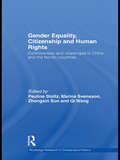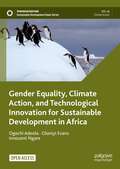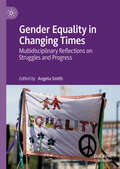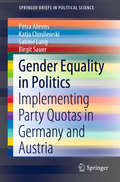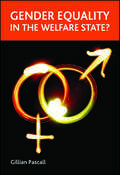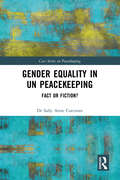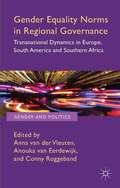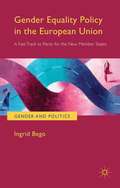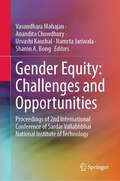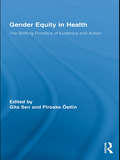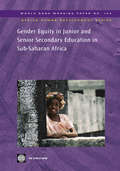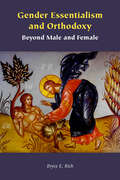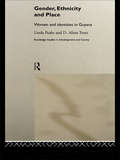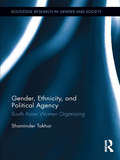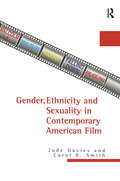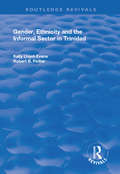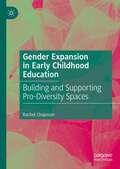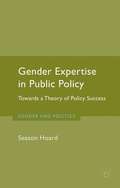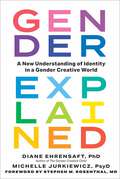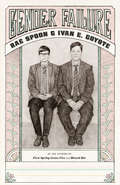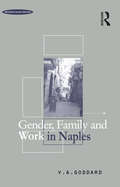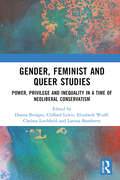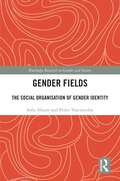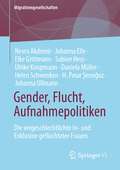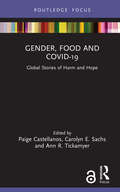- Table View
- List View
Gender Equality, Citizenship and Human Rights: Controversies and Challenges in China and the Nordic Countries (Routledge Research in Comparative Politics)
by Pauline Stoltz Marina Svensson Sun Zhongxin Qi WangThis comparative volume examines the ways in which current controversies and political, legal, and social struggles for gender equality raise conceptual questions and challenge our thinking on political theories of equality, citizenship and human rights. Bringing together scholars and activists who reflect upon challenges to gender equality, citizenship, and human rights in their respective societies; it combines theoretical insights with empirically grounded studies. The volume contextualises feminist political theory in China and the Nordic countries and subsequently puts it into a global perspective. It tackles a complex set of tensions across a dense and shifting landscape and addresses issues including labour, health, democracy, homosexuality, migration and racism. By cutting across geographical and disciplinary boundaries, this book will be of interest to students and scholars of comparative politics, gender studies, human rights and also those interested in Scandinavian and Asian politics.
Gender Equality, Climate Action, and Technological Innovation for Sustainable Development in Africa (Sustainable Development Goals Series)
by Ogechi Adeola Olaniyi Evans Innocent NgareThis open access book explores the intersection of gender and climate change, suggests ways in which innovative technologies can accelerate climate relief actions, and offers strategies for integrating climate change initiatives into national policies and planning. By examining the devastating consequences of climate change on women and girls throughout the continent, the authors pose a crucial question: Does gender matter in climate change discussions in Africa? Political and social traditions have burdened women with greater vulnerability to the impacts of climate-related natural disasters, including violence, displacement, poverty, famine and lack of access to clean water. However, women are also key to effective and inclusive climate mitigation, adaptation, and decision-making. The authors provide a compelling discourse that identifi es the social and economic benefi ts for all citizens when genderinclusive policies shape equitable and targeted action plans, from mitigationto adaptation and funding.The UN’s SDG 13 calls for urgent action and commitment to combat climate change. The implementable and action-oriented propositions presented in this book will be of interest to students, educators, practitioners, third-sector actors, and policymakers committed to gender equality, sustainable development and climate action in Africa.
Gender Equality in Changing Times: Multidisciplinary Reflections on Struggles and Progress
by Angela SmithThis edited collection explores issues of gender equality in the global context. Campaigns to achieve gender equality throughout the twentieth century brought about huge changes in westernised countries. In particular, the achievements of second-wave feminism with regards to gender and sexual equality benefit many people today. The famous 'seven demands' of the second-wave movement form the basis of the chapters of this book, probing the advances made legally, socially and culturally. Contributors to this collection acknowledge the advances brought about by the second-wave movement, but highlight the work which still needs to be done in the twenty-first century, including the changes in society that have resulted in shifts in masculinity. Gender Equality in Changing Times is divided into two parts, following an overview of theoretical debates and social contexts that lead us to the current period of gender and sexual relations. Part One looks at gender equality by exploring the 'experience' of being part of a group where gender boundaries still exist, drawing on auto-ethnographies of those in key groups that are central to this debate, as well as interviews with members of such groups. Part Two investigates wider representations of these groups, offering an insight into the geopolitical world of gender relations in Saudi Arabia and China. Ultimately, this collection shows how much has been achieved, yet how far is also left to go. Students and scholars across a range of disciplines, including gender studies, history, education, sociology, media studies, politics, business studies, cultural studies and English literature and linguistics, will find this book of interest.
Gender Equality in Politics: Implementing Party Quotas in Germany and Austria (SpringerBriefs in Political Science)
by Sabine Lang Petra Ahrens Birgit Sauer Katja ChmilewskiThis book provides a timely and unique contribution to current debates on how effectively voluntary party quotas address the persistent underrepresentation of women in legislatures. Using a most similar case design and a mixed-methods approach, the authors draw attention to the ways in which electoral systems and party regulations interface with voluntary party quotas in Germany and Austria. All quota parties in these countries support the goal of equal participation of women and men in elected office, and quotas are presented as a means to precisely that end. In order to assess parties’ commitment to their declared goals, and the effectiveness of quotas, the book introduces the concept of the post-quota gender gap and defines it as the difference between a party’s adopted quota and the actual share of women in legislative bodies at the national and regional level. Complementing the existing literature on recruitment and socio-cultural legacies, the authors argue that the problem of voluntary party quotas lies at the intersection of party quota design and electoral law. Either parties need to design quotas that actually work within a given electoral system, or we need legislative action geared toward advancing parity not just in candidate selection, but in the composition of legislatures. The book draws on gendered candidate and election data, on the party statutes of federal and state-level party organizations, and on interviews with party officials and party women’s organizations.
Gender Equality in the Welfare State?
by Gillian PascallThe relationship between gender and welfare states is of key importance in understanding welfare states and gender equality and inequality. Western welfare states of the post-war era were built on assumptions about gender difference: they treated men as breadwinners and women as carers. Now governments are committed in principle to gender equality. But how far have they come from male breadwinner assumptions to gender equality assumptions? How much do gender differences continue in UK social policy and social practice? The book analyses the male breadwinner model in terms of power, employment, care, time and income, providing a framework for chapters which ask about policies and practices for gender equality in each of these. This new approach to analysis of gender equality in social welfare contextualises national policies and debates within comparative theoretical analysis and data, making the volume interesting to a wide audience.
Gender Equality in UN Peacekeeping: Fact or Fiction? (ISSN)
by Sally Anne CorcoranThis book investigates to what extent UNSCR 1325/WPS agenda has functioned in practice, to advance women’s equality and empowerment in the peacekeeping context and beyond.The book examines whether widespread implementation of UNSCR 1325 and the broader WPS agenda via gender mainstreaming in UN operations has translated into increased gender equality in peacekeeping operations, the broader UN institutional context and, by extension, the host countries in which missions are situated, via norm dissemination. The book investigates this via a review of the implementation of UNSCR1325 in the operations chosen as research sites over three snapshot years. The book undertakes a comparative analysis that scrutinizes if, how and under what conditions gender mainstreaming has succeeded as a strategy to advance gender equality by analyzing the factors/conditions that have led to successful gender mainstreaming across the operational context, and those that have impeded this outcome. The book concludes that, despite rhetorical commitments to women’s equality in peacekeeping since the passage of UNSCR 1325, progress on the ground has remained minimal, and that the operational environment continues to be discriminatory against women. Both quantitatively and qualitatively, women do not participate as equal partners in peacekeeping and continue to have less access to resources and decision-making power, overall. The book interrogates that by exploring the spaces available within law, policy and practice of the UN to pursue the human rights agenda of gender equality and considers whether UNSCR 1325 has enlarged those spaces. It also points to the irony of internal UN structures failing to adequately adapt to their own gender mainstreaming mandates, while those same structures have delivered some gender equality mandates successes externally, at local levels.This book will be of interest to students of peacekeeping, gender studies, and International Relations.
Gender Equality Norms In Regional Governance
by Anna Van Der Vleuten Anouka Van Eerdewijk Conny RoggebandThis book analyses the diffusion of norms concerning gender-based violence and gender mainstreaming of aid and trade between the EU, South America and Southern Africa. Norm diffusion is conceptualized as a truly multidirectional and polycentric process, shaped by regional governance and resulting in new geometries of transnational activism.
Gender Equality Policy in the European Union
by Ingrid BegoThis book examines the role that the European Union (EU) has played in enhancing democratic values in new member states by requiring the adoption of gender equality laws, such as equal employment and reconciliation policies, in return for membership. Considering four EU member states in Central Eastern Europe - Bulgaria, Czech Republic, Latvia and Poland - it debates if and under what conditions the incentives for EU membership positively affected the successful adoption and implementation of gender equality policies. The book looks at the role of formal and informal domestic institutions to understand successful alliances in each case study, and considers the dynamic relationship between domestic and international actors in the context of global governance. Engaging with the study of public policy, this book discusses how the EU is capable of successful promotion of human rights and democratic values in general and provides insight on how any supranational organization can establish effective incentive structures to produce desired outcomes.
Gender Equity: Proceedings of 2nd International Conference of Sardar Vallabhbhai National Institute of Technology
by Vasundhara Mahajan Anandita Chowdhury Urvashi Kaushal Namrta Jariwala Sharon A. BongThis book comprises the proceedings of the TEQIP III Sponsored 2nd International Conference on “Gender Equity: Challenges and Opportunities” (2nd ICOGECAO 2020 -Virtual Mode), held at Sardar Vallabhbhai National Institute of Technology, Surat, Gujarat, India, from 25 to 27 November 2020. ICOGECAO provided a platform for researchers from multiple countries to present their views about the challenges associated with gender equity. Gender equity is one of the seventeen Sustainable Development Goals (SDG 5) set up by the United Nations in 2015, to promote and empower all genders equally. The proceedings strongly support the ideas of gender neutrality and blow out the mind-set of limiting gender studies to only women rights. They offer a collection of articles that break the stereotypes and myths often wrongly associated with gender. The ideas in the presented papers highlight gender-based discriminations, ask important questions and share facts that encompass beyond the so-called boundary lines. The authors contributed on various topics including but not limited to violence, crime, discrimination, and abuse against women and LGBTQ+ community. The basic motive of the presented book is to incorporate ideas and contribute to the sensitization and education about the important yet often neglected issues of gender equality. Thus, this book proves to be an essential resource for educators and researchers working in the field of gender studies. The work presents challenges caused due to COVID-19, social media, popular culture and work–life balance and explores empowerment through law, skills, technology and media. Some interesting case studies highlighted gender discrimination in science, sports and law. A variety of papers on literary texts were examined from a gender lens. The proceeding is divided into five subsections: 1. law, 2. literature, 3. management, 4. sociology and 5. social studies. The proceeding provides a wider perceptive and visuals about the scenarios which needs attention. The ideas presented will be helpful for achieving the sustainable development goal of gender equity to a greater extent.
Gender Equity in Health: The Shifting Frontiers of Evidence and Action (Routledge Studies in Health and Social Welfare)
by Gita Sen Piroska ÖstlinThis volume brings together experts from a variety of disciplines, such as medicine, biology, sociology, epidemiology, anthropology, economics and political science, who focus on three areas: health disparities and inequity due to gender, the specific problems women face in meeting the highest attainable standards of health, and the policies and actions that can address them. Highlighting the importance of intersecting social hierarchies (e.g. gender, class and ethnicity) for understanding health inequities and their implications for health policy, contributors detail and recommend policy approaches and agendas that incorporate, but go beyond commonly acknowledged issues relating to women’s health and gender equity in health.
Gender Equity in Junior and Senior Secondary Education in Sub-Saharan Africa
by World BankThis thematic study consists of case studies of Ghana, Malawi, and Uganda, as well as, a review of studies undertaken over the past ten years on education in Africa with particular attention to girls' and secondary education. Gender equity at the primary level has been the focus of considerable attention within the Education for All Framework of Action, but much less so at the secondary level. Evidence of gender inequity and inequality in terms of access, retention and performance in secondary education in SSA raises many questions. While transition rates from primary to secondary are higher for girls than boys, and the repetition rates are lower, girls still significantly trail behind boys in graduation and enrollment rates. The purpose of this study is to document and analyze the extent and nature of gender disadvantage in junior and senior secondary education, to analyze the causes of this disadvantage, and to identify strategies that may be effective in reducing or eliminating it. This study was prepared as part of the Secondary Education and Training in Africa (SEIA) initiative which aims to assist countries to develop sustainable strategies for expansion and quality improvements in secondary education and training. All SEIA products are available on its website: www.worldbank.org/afr/seia.
Gender Essentialism and Orthodoxy: Beyond Male and Female (Orthodox Christianity and Contemporary Thought)
by Bryce E. RichWithin contemporary orthodoxy, debates over sex and gender have become increasingly polemical over the past generation. Beginning with questions around women’s ordination, arguments have expanded to include feminism, sexual orientation, the sacrament of marriage, definitions of family, adoption of children, and care of transgender individuals. Preliminary responses to each of these topics are shaped by gender essentialism, the idea that male and female are ontologically fixed and incommensurate categories with different sets of characteristics and gifts for each sex. These categories, in turn, delineate gender roles in the family, the church, and society.Gender Essentialism and Orthodoxy offers an immanent critique of gender essentialism in the stream of the contemporary Orthodox Church influenced by the “Paris School” of Russian émigré theologians and their heirs. It uses an interdisciplinary approach to bring into conversation patristic reflections on sex and gender, personalist theological anthropology, insights from gender and queer theory, and modern biological understandings of human sexual differentiation. Though these are seemingly unrelated discourses, Gender Essentialism and Orthodoxy reveals unexpected points of convergence, as each line of thought eschews a strict gender binary in favor of more open-ended possibilities.The study concludes by drawing out some theological implications of the preceding findings as they relate to the ordination of women to the priesthood, same-sex unions and sacramental understandings of marriage, definitions of family, and pastoral care for intersex, transgender, and nonbinary parishioners.
Gender, Ethnicity and Place: Women and Identity in Guyana (Routledge Studies in Development and Society)
by Linda Peake D. Alissa TrotzThis book is concerned with the nature of the relationship between gender, ethnicity and poverty in the context of the external and internal dynamics of households in Guyana. Using detailed data collected from male and female respondents in three separate locations, two urban and one rural, and across two major ethnic groups, Afro-Guyanese and Indo-Guyanese, the authors discuss the links between gender and race, exploring development issues from a feminist perspective.
Gender, Ethnicity and Political Agency: South Asian Women Organizing (Routledge Research in Gender and Society #35)
by Shaminder TakharThis book examines how South Asian women’s collective agency is operationalized through civic organizations in the UK. Drawing on black feminist theory and third world feminism, it shows the complexity of political agency and its relationship to identity and subjectivity, and uses empirical research to demonstrate how women are empowered to resist domination. The historically racialized image of the South Asian woman as lacking in political agency is challenged through their long history of activism on the Indian subcontinent. The creation of "critical spaces" by South Asian women in the diaspora places them as active agents who have successfully influenced social policy on important issues such as forced marriage, domestic violence and sexuality. The engagement with the empirical data demonstrates the significance and impact of race, racism, sexism and religion on the lives of the women. The book brings to the fore the pursuit of equality, rights and justice, including multiculturalism and the often debated emancipatory role of religion.
Gender, Ethnicity, and Sexuality in Contemporary American Film (Baas Paperbacks Ser. #Vol. 5)
by Jude Davies Carol R. SmithFirst Published in 2000. Routledge is an imprint of Taylor & Francis, an informa company.
Gender, Ethnicity and the Informal Sector in Trinidad
by Robert B. Potter Sally Lloyd-EvansThis title was first published in 2002. Throughout much of the developing world and especially in Africa and Latin America, the informal employment sector is growing spectacularly. This study focuses on the gender and ethnic aspects of the informal economy in Trinidad.
Gender Expansion in Early Childhood Education: Building and Supporting Pro-Diversity Spaces
by Rachel ChapmanThis book explores the contexts for gender identity development in early childhood education, examining how early childhood educators’ views on children’s gender identity influence their practice in Australia. The author utilizes feminist post-structuralism, queer theory and performativity as theoretical approaches, and feminist post-structuralist discourse and thematic analyses. The book captures the voices of educators and developers of curriculum documents to explore how gender expansive environments can be created when such environments are socially and politically contentious. It then identifies discourses that enable and constrain the building of pro-diversity spaces and contexts in early childhood education, while considering how to disrupt normative notions of gender and promote the deployment of discursive agency.
Gender Expertise in Public Policy
by Season HoardThrough a selection of in-depth interviews, survey analysis and Qualitative Comparative Analysis of policy debates in post-industrial democracies, this text examines the impact of gender experts on the policy process, and specifically how the advice and recommendations of gender experts are used by policymakers. It rethinks our understanding of gender expertise and the circumstances and factors that lead to expert success in public policy, and identifieS the actors involved in this process. This volume also contributes to scholarly knowledge on gender expertise through the inclusion of an in-depth review of feminist and non-feminist literatures, and develops a conceptualization of gender expertise that can be utilized to drive future research.
Gender Explained: A New Understanding of Identity in a Gender Creative World
by Diane Ehrensaft Michelle JurkiewiczA world-leading expert and clinical psychologist team up to explain everything you may not know about gender: what it is, where it came from, and why it’s changing. Gender is everywhere. Politicians argue over it, educational systems struggle to define it, and our friends, neighbors, and children explore it. More than ever before, young people are questioning their gender identities and redefining the role of gender in their lives. How should our society—and we as individuals (parents, teachers, friends)—respond? In Gender Explained, Diane Ehrensaft, PhD, and Michelle Jurkiewicz, PsyD, separate medical fact from fear-mongering falsehoods and answer these questions: What should parents do when their child starts experiencing gender dysphoria? Which sports teams should transgender youth play on? How should schools teach young people about gender? And most important: What is gender-affirming care, and when should an individual have access to it? With clear, expert guidance, this book is a safeguard against political vitriol, and it offers urgent protection for those among us who are transgender and/or nonbinary. Far more than an introduction to gender creativity, it is an invitation to develop compassion for everyone along the gender continuum.
Gender Failure
by Ivan E. Coyote Rae Spoon"Being a girl was something that never really happened for me." -Rae SpoonIvan E. Coyote and Rae Spoon are accomplished, award-winning writers, musicians, and performers; they are also both admitted "gender failures." In their first collaborative book, Ivan and Rae explore and expose their failed attempts at fitting into the gender binary, and how ultimately our expectations and assumptions around traditional gender roles fail us all.Based on their acclaimed 2012 live show that toured across the United States and in Europe, Gender Failure is a poignant collection of autobiographical essays, lyrics, and images documenting Ivan and Rae's personal journeys from gender failure to gender enlightenment. Equal parts hilarious and heartbreaking, it's a book that will touch LGBTQ readers and others, revealing, with candor and insight, that gender comes in more than two sizes.Ivan E. Coyote is the author of six story collections and the award-winning novel Bow Grip, and is co-editor of Persistence: All Ways Butch and Femme. Ivan frequently performs at high schools, universities, and festivals across North America.Rae Spoon is a transgender indie musician whose most recent CD is My Prairie Home, which is also the title of a new National Film Board of Canada documentary about them. Rae's first book, First Spring Grass Fire, was a Lambda Literary Award finalist in 2013.
Gender, Family and Work in Naples
by Victoria A. GoddardBreaking new ground in Mediterreanean anthropology, this book rejects the discipline's traditional focus on honour and shame in small face-to-face communities, and suggests instead that gender and sexuality interact with material processes in the constitution of personal and social identities. In this ethnographic account of the labour market in Naples, the author shows how cultural definitions of gender can be used to investigate broad social processes. Scarce stable employment in the area means that household members are forced to diversify their economic activities in order to survive. Petty entrepreneurship is an option which is almost exclusively available to men. Women, who are either unable or unwilling to obtain factory work, are generally confined to the status of outworkers. The author emphasises that individual choices cannot be attributed solely to economic opportunities but that concepts of selfhood, gender identity and the symbolic value of female sexuality are also important.
Gender, Feminist and Queer Studies: Power, Privilege and Inequality in a Time of Neoliberal Conservatism
by Donna Bridges Clifford Lewis Elizabeth Wulff Chelsea Litchfield Larissa BamberryExploring scholarship, research, practice and activism on gender, feminist and queer studies, this edited collection examines, analyses and critiques the nature and causes of inequality, disadvantage and marginalisation faced by women, non-hegemonic and LGBTIQA+ identities who do not fit hegemonic notions of masculinity, femininity and heteronormativity. The chapters in this book critically analyse and challenge visible and invisible power relations, privilege and prejudice by problematising the artificial organisation of people into hierarchies that preference hegemonic masculinities, white and heteronormative identities. In questioning often unchallenged and legitimised inequality and disadvantage, this book locates itself in the juxtaposition where the lived experiences of individuals, activism, community participation, research and scholarship collide with mainstream, local, national and globalised culture and politics. Divided into four parts, this book provides a platform for interrogating how social change can occur in the current neoliberal political context of increasing conservatism.
Gender Fields: The Social Organisation of Gender Identity (Routledge Research in Gender and Society)
by Sofia Aboim Pedro VasconcelosExploring gender through the lens of field theory, Gender Fields proposes a new framework for understanding the social organisation of gender identity. In conversation with Pierre Bourdieu's field theory, the book conceptualises under-theorised situated dimensions of gender, bridging the gap between macro and micro theories of gender. Drawing on extensive fieldwork conducted over five years in several countries in Europe and beyond, the authors situate gender as a critical site of autonomous socio-political struggle and highlight the centrality of the transgender experience in redefining gendered personhood and freedom. Increased trans visibility catalysed new social and political arenas of contestation that expanded the potential for reimagining gender norms and identities. The authors examine political and legal arenas, the medical field and health markets, gender naming, individual practices, and material-discursive embodiments, offering new insights into gender change. While numerous explanations have been proposed, this book offers a fresh perspective on these revolutionary developments. Gender Fields characterises gender as a field of struggle through a set of basic tools that can be usefully applied to studies in diverse settings. As such, it will appeal to scholars across the social sciences with an interest in issues of gender, social theory and identity.
Gender, Flucht, Aufnahmepolitiken: Die vergeschlechtlichte In- und Exklusion geflüchteter Frauen (Migrationsgesellschaften)
by Nevra Akdemir Johanna Elle Elke Grittmann Sabine Hess Ulrike Koopmann Daniela Müller Helen Schwenken H. Pınar Şenoğuz Johanna UllmannFlucht- und Aufnahmeprozesse sind durchzogen von geschlechtsspezifischen und intersektionalen Dynamiken. Die Autorinnen haben diese und das darin zu Tage tretende Geschlechterwissen im Verbundforschungsprojekt „Gender – Flucht – Aufnahmepolitiken“ für die Themen Unterbringung, Gewaltschutz, Erwerbstätigkeit, Medien, Familie, ‚Heimischwerden‘ und Solidarität analysiert.Die migrationsbezogene Infrastruktur hat sich in der deutschen Migrationsgesellschaft auf die Bedarfe von Geflüchteten eingestellt. Geflüchtete machen mit den Angeboten vielfältige Erfahrungen, die von hilfreicher und solidarischer Unterstützung über wenig angepasste Angebote bis zu Exklusion und Diskriminierung reichen. Die rahmende Medienanalyse zeigt, wie tief die öffentliche und mediale Rezeption der sogenannten „Flüchtlingskrise“ durch vergeschlechtlichte Narrative geprägt ist, und wie diese die kommunale und ehrenamtliche Arbeit mit Geflüchteten mitprägen.Der Band richtet sich an Interessierte aus Studium, Forschung und Praxis, die sich mit Flucht, Migration und/oder Geschlechterverhältnissen befassen.
Gender, Food and COVID-19: Global Stories of Harm and Hope (Routledge Focus on Environment and Sustainability)
by Paige Castellanos, Carolyn E. Sachs and Ann R. TickamyerThis book documents how COVID-19 impacts gender, agriculture, and food systems across the globe with on-the-ground accounts and personal reflections from scholars, practitioners, and community members. During the coronavirus pandemic with many people under lockdown, continual agricultural production and access to food remain essential. Women provide much of the formal and informal work in agriculture and food production, distribution, and preparation often under precarious conditions. A cadre of scholars and practitioners from across the globe provide their timely observations on these issues as well as more personal reflections on its impact on their lives and work. Four major themes emerge from these accounts and are interwoven throughout: the pervasiveness of food insecurity, the ubiquity of women’s care work, food justice, and policies and research that can that can result in a resilience that reimagines the future for greater gender and intersectional equality. We identify what lessons we can learn from this global pandemic about research and practices related to gender, food, and agricultural systems to strive for more equitable arrangements. This book will be of great interest to students, scholars and practitioners working on gender and food and agriculture during this global pandemic and beyond.
